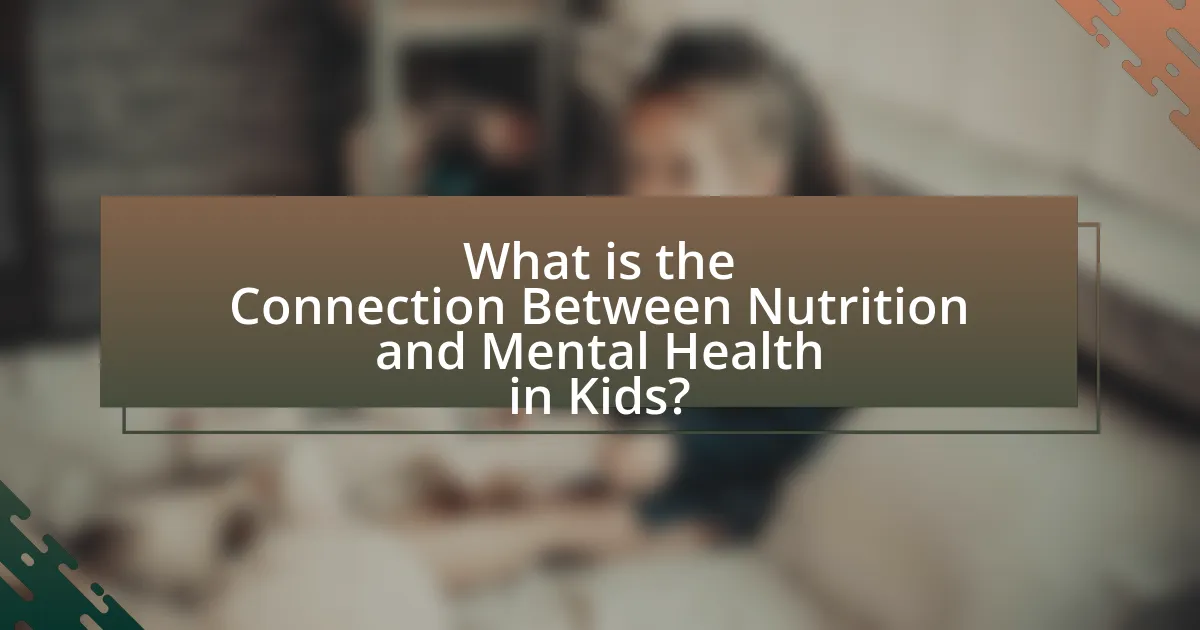The article explores the significant connection between nutrition and mental health in children, emphasizing how a balanced diet rich in essential nutrients supports brain development and emotional well-being. It highlights the impact of nutritional deficiencies, such as omega-3 fatty acids, vitamins, and minerals, on increasing risks of anxiety, depression, and behavioral issues. Key nutrients essential for mental health, the role of parents and educators in promoting healthy eating habits, and the influence of nutrition on common mental health conditions like ADHD and autism spectrum disorders are discussed. The article also provides practical steps for improving children’s diets and resources available for parents to enhance nutrition for better mental health outcomes.

What is the Connection Between Nutrition and Mental Health in Kids?
Nutrition significantly influences mental health in kids, as a balanced diet provides essential nutrients that support brain development and function. Research indicates that deficiencies in key nutrients, such as omega-3 fatty acids, vitamins, and minerals, can lead to increased risks of anxiety, depression, and behavioral issues in children. For instance, a study published in the journal “Nutritional Neuroscience” found that children with diets high in processed foods and low in fruits and vegetables exhibited higher levels of emotional and behavioral problems. This evidence underscores the critical role of proper nutrition in promoting mental well-being among children.
How does nutrition influence mental health in children?
Nutrition significantly influences mental health in children by affecting brain development and function. A balanced diet rich in essential nutrients, such as omega-3 fatty acids, vitamins, and minerals, supports cognitive processes and emotional regulation. Research indicates that deficiencies in nutrients like iron and zinc can lead to increased anxiety and depression in children. For instance, a study published in the journal “Nutrients” found that children with higher intakes of fruits, vegetables, and whole grains exhibited better mental health outcomes compared to those with diets high in processed foods. This evidence underscores the critical role of nutrition in shaping the mental well-being of children.
What specific nutrients are essential for children’s mental well-being?
Essential nutrients for children’s mental well-being include omega-3 fatty acids, B vitamins, vitamin D, iron, and zinc. Omega-3 fatty acids, found in fish and flaxseeds, are crucial for brain development and function, with studies indicating that they can improve mood and cognitive performance. B vitamins, particularly B6, B12, and folate, play a significant role in neurotransmitter synthesis, impacting mood regulation. Vitamin D, obtained from sunlight and fortified foods, is linked to reduced risk of depression in children. Iron is vital for oxygen transport in the brain, and deficiency can lead to cognitive impairments. Zinc supports brain health and has been associated with improved mood and cognitive function. These nutrients collectively contribute to optimal mental health in children, as supported by various nutritional studies.
How do deficiencies in nutrition affect children’s mood and behavior?
Deficiencies in nutrition significantly impact children’s mood and behavior by leading to increased irritability, anxiety, and depressive symptoms. Research indicates that inadequate intake of essential nutrients, such as omega-3 fatty acids, vitamins, and minerals, can disrupt neurotransmitter function and brain development, which are crucial for emotional regulation. For instance, a study published in the journal “Nutritional Neuroscience” found that children with lower levels of omega-3 fatty acids exhibited higher levels of behavioral problems and mood disturbances. Additionally, deficiencies in iron and zinc have been linked to increased aggression and hyperactivity in children, as highlighted in research from the “Journal of Child Psychology and Psychiatry.” These findings underscore the critical role of proper nutrition in maintaining emotional well-being and stable behavior in children.
Why is understanding this connection important for parents and educators?
Understanding the connection between nutrition and mental health is crucial for parents and educators because it directly influences children’s cognitive development and emotional well-being. Research indicates that a balanced diet rich in essential nutrients can enhance brain function, improve mood, and reduce the risk of mental health issues in children. For instance, a study published in the journal “Nutrients” found that children with higher intakes of fruits, vegetables, and omega-3 fatty acids exhibited better mental health outcomes. This knowledge empowers parents and educators to make informed dietary choices that support children’s overall development and mental resilience.
What role do parents play in shaping their children’s dietary habits?
Parents play a crucial role in shaping their children’s dietary habits by influencing food choices, meal patterns, and attitudes toward nutrition. Research indicates that children are more likely to adopt healthy eating behaviors when parents model these behaviors, provide nutritious foods, and create a positive mealtime environment. For instance, a study published in the Journal of Nutrition Education and Behavior found that parental involvement in meal preparation and family meals is associated with increased fruit and vegetable consumption among children. This demonstrates that active parental engagement directly impacts children’s dietary preferences and habits, ultimately affecting their overall health and mental well-being.
How can educators support healthy nutrition in schools?
Educators can support healthy nutrition in schools by implementing comprehensive nutrition education programs and promoting healthy food options in school cafeterias. Research indicates that nutrition education can significantly improve students’ dietary habits, leading to better mental health outcomes. For instance, a study published in the Journal of School Health found that students who participated in nutrition education programs showed increased knowledge about healthy eating and made healthier food choices. Additionally, schools can collaborate with local farms to provide fresh produce, ensuring that students have access to nutritious meals, which is essential for cognitive function and emotional well-being.

What are the common mental health issues in kids related to nutrition?
Common mental health issues in kids related to nutrition include anxiety, depression, and attention-deficit/hyperactivity disorder (ADHD). Research indicates that poor nutrition can lead to deficiencies in essential nutrients, which are critical for brain development and function. For instance, studies have shown that diets low in omega-3 fatty acids and high in processed sugars are linked to increased symptoms of anxiety and depression in children. Additionally, a systematic review published in the journal “Nutrients” found that inadequate intake of vitamins and minerals, such as iron and zinc, is associated with behavioral problems and cognitive impairments in children.
How does poor nutrition contribute to anxiety and depression in children?
Poor nutrition significantly contributes to anxiety and depression in children by affecting brain chemistry and overall health. Nutritional deficiencies, particularly in essential fatty acids, vitamins, and minerals, can impair neurotransmitter function, leading to mood disorders. For instance, a study published in the journal “Nutritional Neuroscience” found that children with diets low in omega-3 fatty acids exhibited higher levels of anxiety and depression. Additionally, inadequate intake of fruits and vegetables has been linked to increased emotional distress, as these foods provide vital nutrients that support mental health. Thus, poor nutrition disrupts the biochemical processes necessary for emotional regulation, increasing the risk of anxiety and depression in children.
What are the signs of anxiety and depression linked to dietary habits?
Signs of anxiety and depression linked to dietary habits include changes in appetite, mood swings, fatigue, and difficulty concentrating. Research indicates that poor dietary choices, such as high sugar and processed food intake, can exacerbate these symptoms. For instance, a study published in the journal “Nutrients” found that children consuming a diet low in fruits, vegetables, and whole grains are at a higher risk for developing anxiety and depression. Additionally, deficiencies in essential nutrients like omega-3 fatty acids and vitamins B and D have been associated with increased mental health issues.
How can improving nutrition alleviate these mental health issues?
Improving nutrition can alleviate mental health issues in children by providing essential nutrients that support brain function and emotional regulation. A balanced diet rich in omega-3 fatty acids, vitamins, and minerals has been linked to reduced symptoms of anxiety and depression. For instance, a study published in the journal “Nutritional Neuroscience” found that children who consumed a diet high in fruits, vegetables, and whole grains exhibited lower levels of behavioral problems and improved mood. Additionally, deficiencies in nutrients such as zinc and iron have been associated with increased irritability and mood disorders in children, highlighting the importance of proper nutrition in mental health.
What other mental health conditions are influenced by nutrition?
Nutrition influences several mental health conditions beyond general well-being, including anxiety, depression, and attention-deficit/hyperactivity disorder (ADHD). Research indicates that diets rich in omega-3 fatty acids, vitamins, and minerals can reduce symptoms of anxiety and depression. For instance, a study published in the journal “Nutrients” found that children with ADHD showed improvement in symptoms when their diets were supplemented with omega-3 fatty acids. Additionally, deficiencies in certain nutrients, such as iron and zinc, have been linked to increased anxiety levels in children, as highlighted in research from the “Journal of Affective Disorders.” Thus, nutrition plays a critical role in the management and prevention of these mental health conditions.
How does nutrition impact attention deficit hyperactivity disorder (ADHD)?
Nutrition significantly impacts attention deficit hyperactivity disorder (ADHD) by influencing brain function and behavior. Specific nutrients, such as omega-3 fatty acids, zinc, iron, and certain vitamins, have been shown to play a role in managing ADHD symptoms. For instance, a study published in the journal “Nutritional Neuroscience” found that children with ADHD often have lower levels of omega-3 fatty acids, which are crucial for cognitive function and emotional regulation. Additionally, deficiencies in micronutrients like zinc and iron have been linked to increased hyperactivity and impulsivity in children. Therefore, a balanced diet rich in these essential nutrients can help mitigate ADHD symptoms and improve overall mental health in children.
What is the relationship between nutrition and autism spectrum disorders?
The relationship between nutrition and autism spectrum disorders (ASD) is significant, as certain dietary patterns and nutrient deficiencies can influence the severity of symptoms in individuals with ASD. Research indicates that children with ASD may benefit from specific dietary interventions, such as gluten-free or casein-free diets, which some studies suggest can lead to improvements in behavior and social skills. For instance, a study published in the Journal of Autism and Developmental Disorders found that dietary changes resulted in reduced gastrointestinal symptoms and improved behavioral outcomes in children with ASD. Additionally, deficiencies in omega-3 fatty acids, vitamins, and minerals have been linked to increased severity of ASD symptoms, highlighting the importance of a balanced diet in managing the condition.
How can parents and caregivers improve their children’s nutrition for better mental health?
Parents and caregivers can improve their children’s nutrition for better mental health by providing a balanced diet rich in fruits, vegetables, whole grains, lean proteins, and healthy fats. Research indicates that diets high in nutrients such as omega-3 fatty acids, vitamins, and minerals are linked to improved mood and cognitive function. For instance, a study published in the journal “Nutritional Neuroscience” found that children who consumed a diet rich in fruits, vegetables, and fish exhibited lower levels of anxiety and depression. Additionally, limiting processed foods and sugars can help stabilize mood and energy levels, further supporting mental well-being.
What practical steps can be taken to enhance children’s diets?
To enhance children’s diets, parents and caregivers should focus on incorporating a variety of fruits, vegetables, whole grains, and lean proteins into daily meals. Research indicates that a balanced diet rich in these food groups supports cognitive function and emotional well-being in children. For instance, a study published in the journal “Nutrients” found that children who consume higher amounts of fruits and vegetables exhibit better mental health outcomes, including lower levels of anxiety and depression. Additionally, involving children in meal planning and preparation can foster a positive attitude towards healthy eating, making them more likely to choose nutritious options.
How can meal planning and preparation support better nutrition?
Meal planning and preparation can significantly support better nutrition by ensuring that balanced meals are consistently available, which helps in meeting dietary needs. When families engage in meal planning, they can select a variety of nutrient-dense foods, such as fruits, vegetables, whole grains, and lean proteins, which are essential for children’s growth and cognitive development. Research indicates that children who consume a balanced diet rich in these nutrients exhibit improved mental health outcomes, including better mood regulation and reduced anxiety levels. Additionally, meal preparation allows for portion control and reduces reliance on processed foods, which are often high in sugars and unhealthy fats, further promoting healthier eating habits.
What are some healthy snack options that promote mental well-being?
Healthy snack options that promote mental well-being include nuts, yogurt, fruits, and whole-grain crackers. Nuts, such as walnuts and almonds, are rich in omega-3 fatty acids and antioxidants, which have been linked to improved cognitive function and mood stabilization. Yogurt contains probiotics that can enhance gut health, which is increasingly associated with mental health benefits. Fruits like blueberries and bananas provide essential vitamins and minerals, including vitamin C and potassium, that support brain health. Whole-grain crackers offer complex carbohydrates that help maintain stable blood sugar levels, contributing to better focus and mood. These snacks collectively support mental well-being through their nutritional profiles and positive effects on brain function.
What resources are available for parents seeking to improve nutrition?
Parents seeking to improve nutrition can access a variety of resources, including government programs, educational websites, and community initiatives. The USDA’s MyPlate offers guidelines and tools for balanced meals, while the Academy of Nutrition and Dietetics provides articles and tips specifically for families. Additionally, local health departments often run nutrition workshops and cooking classes aimed at parents. Research indicates that proper nutrition positively impacts children’s mental health, emphasizing the importance of these resources in supporting both physical and psychological well-being.
How can community programs assist in promoting healthy eating habits?
Community programs can assist in promoting healthy eating habits by providing education, resources, and access to nutritious foods. These programs often include cooking classes, nutrition workshops, and community gardens, which empower individuals with knowledge about healthy food choices and preparation techniques. For instance, a study published in the Journal of Nutrition Education and Behavior found that participants in community-based nutrition education programs increased their fruit and vegetable intake by 25%. Additionally, community programs can facilitate partnerships with local farmers and markets to improve access to fresh produce, thereby addressing food deserts and enhancing dietary options for families.
What role do pediatricians play in guiding nutrition for mental health?
Pediatricians play a crucial role in guiding nutrition for mental health by assessing dietary habits and providing tailored nutritional advice to promote cognitive and emotional well-being in children. They educate families on the impact of specific nutrients, such as omega-3 fatty acids and vitamins, on mental health outcomes, emphasizing the importance of a balanced diet. Research indicates that proper nutrition can reduce the risk of mental health disorders; for instance, a study published in the journal “Nutrients” found that children with higher fruit and vegetable intake exhibited lower levels of anxiety and depression. By integrating nutritional guidance into routine check-ups, pediatricians help to establish healthy eating patterns that support both physical and mental health in children.
What are some tips for fostering a positive relationship with food in children?
To foster a positive relationship with food in children, parents should encourage a balanced diet while promoting mindful eating practices. Research indicates that involving children in meal preparation can enhance their interest in healthy foods and improve their willingness to try new items. Additionally, creating a positive mealtime environment, free from distractions, allows children to focus on their food and develop a healthy relationship with eating. Studies show that when children are allowed to listen to their hunger cues and make choices about their meals, they are more likely to develop a positive attitude towards food.
